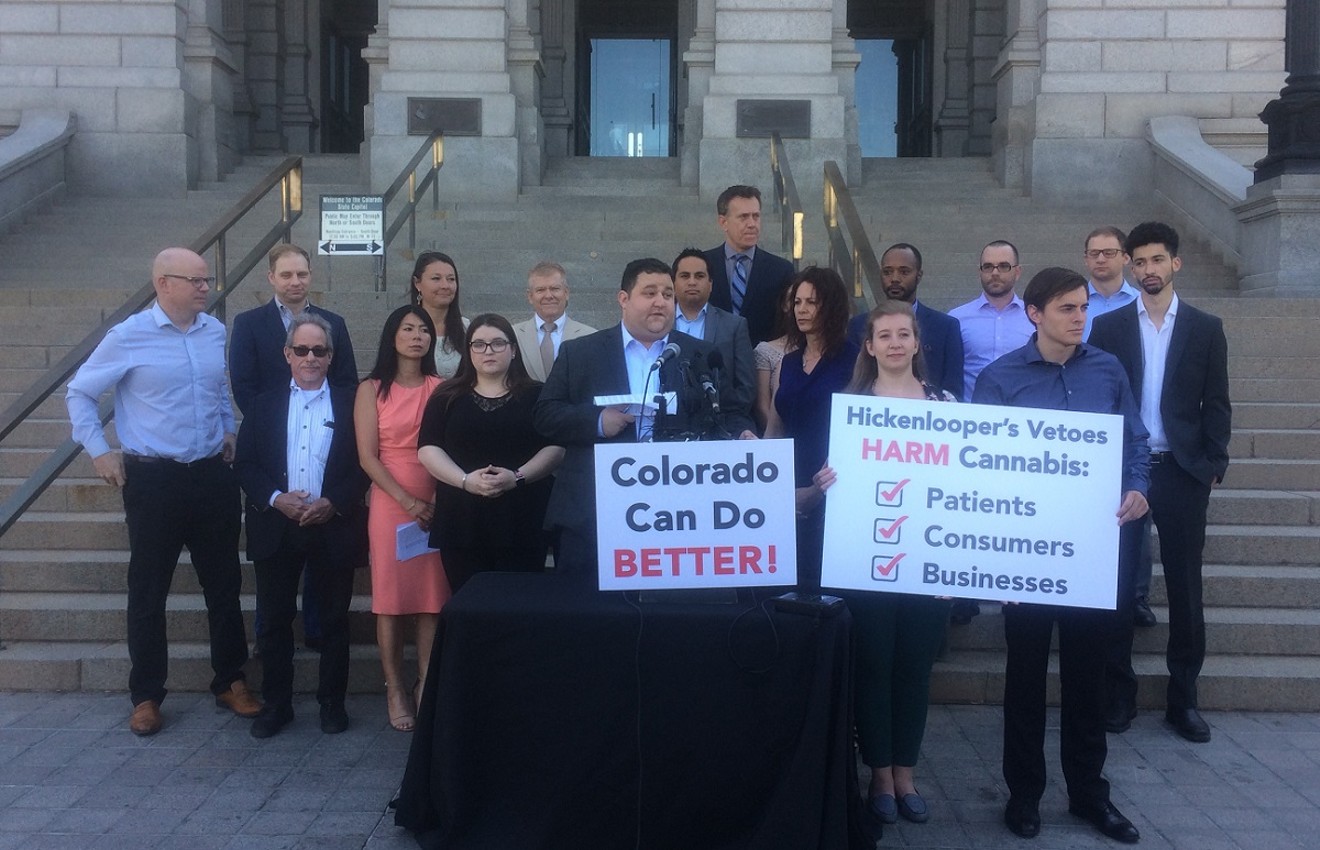State senator Tim Neville and state representatives Edie Hooton, Dan Pabon and Kevin Van Winkle — all of whom had sponsored pot bills vetoed by Hickenlooper — were among those appearing at the rally; they were joined by representatives of the Marijuana Industry Group, Vicente Sederberg law group, CannAbility Foundation and Mothers Advocating Medical Marijuana for Autism.
One of the bills, HB 1263, would have added autism spectrum disorder to the state's list of conditions that qualify for MMJ; HB 1258 would have allowed dispensaries to open product sampling areas; and a third, HB 1011, would have loosened investment restrictions on cannabis businesses. All three had passed through the Colorado General Assembly, and supporters say they didn't have a hint that Hickenlooper might veto them until it was too late. Now none of the proposals can be revisited until next year, because the vetoes came four weeks after the session ended.
Hooton, who'd introduced HB 1263 and had another bill she'd sponsored that would have given tax credits to cigar distributors vetoed by Hickenlooper on June 1, said it was "absolutely devastating" to see the autism bill nixed. The governor isn't actively engaged in the state legislature, she told Westword, adding that he acts like he is above the lawmaking process, like "some sort of grand wizard."
"Not once did anyone in the governor's office become engaged on any level of this legislation," she said. "We should be going forward. We should be leading in this country, not following."
At least eight states as well as Washington, D.C., have approved legislation that allows doctors to recommend MMJ to autism patients, but Hickenlooper said he vetoed the bill because he was concerned about "unintended consequences" and cited a need for evidence. When he vetoed the bill on June 5, Hickenlooper also said he was issuing an executive order for "the State Board of Health to evaluate the safety and efficacy of medical marijuana for the treatment of autism spectrum disorders in children." With Hickenlooper traveling, Lieutenant Governor Donna Lynne signed that order on June 6.
In a letter explaining his veto of HB 1263, Hickenlooper said his office spent a month visiting with the "proponents, families and parents of children with ASD, and the medical community" before coming to his decision. "Their passion and eloquence in advocating for their children, and desire to seek out other treatment options for their children, was very moving. For this reason, we do not issue this veto lightly," he wrote. “While we are very sympathetic with families advocating medical marijuana (MMJ) as a safer and more effective treatment for their children, we cannot ignore such overwhelming concerns from the medical community."

Hickenlooper met with a handful of autistic children and their families to discuss the bill before ultimately vetoing it on June 5.
Thomas Mitchell
For children suffering from ASD without epilepsy (a qualifying MMJ condition), which accounts for about two-thirds of all children diagnosed with ASD, Hickenlooper's executive order for further studies wasn't enough, Walker says.
Walker, who appeared outside the Capitol today representing Mothers Advocating Medical Marijuana for Autism, says Hickenlooper had suggested that she and other parents with autistic children attempt to get MMJ recommendations for their children for conditions that currently qualify, such as chronic pain or muscle spasms. She also says that the governor suggested that parents buy cannabis products themselves from retail stores and give them to their children, which would be illegal.
Hickenlooper is currently out of the state, but his office passed on his response to those critics: "For me, it’s about helping families and their kids who have autism. It’s a complex disorder that requires families and doctors working together on the best treatment for each child. Our executive order to expedite research on the use of medical marijuana as a treatment for children with autism lays the groundwork for what we hope will be another evidence-based treatment for families in the near future. In the meantime, we have the commitment from those working closest with these kids to continue to provide the relief and support they deserve."
The governor's office also said that Hickenlooper was only "inquiring" about other possible MMJ conditions that children could qualify for, and that his comments to parents about buying cannabis themselves were taken out of context. "It was a complete misunderstanding," Hickenlooper's press secretary, Jaqcue Montgomery, said. "He was just inquiring about how [the families] currently treated their children."
But those weren't the only beefs on display at the Capitol today.
Senator Tim Neville, who sponsored both the dispensary tasting-room bill and the measure easing investment rules for cannabis businesses, also criticized the governor for his vetoes and restrictions on state-legalized businesses. "I think it's very apparent this is not a Republican-Democrat issue," Neville said during the press conference, adding that allowing Colorado cannabis consumers a place to consume was about "freedom" and "individual liberty."
HB 1258, the tasting-room bill, received plenty of attention during its run at the legislature, with sponsors postponing readings and adding several amendments to ensure that it gained enough support from lawmakers representing districts that ban cannabis sales. While the tasting-room measure's veto disappointed cannabis users looking for a place to consume outside of their homes, HB 1011's dismissal hurt all of the pot industry and not just dispensaries, according to Neville, who says pot businesses are currently in "no-man's land" thanks to harsh federal tax codes and current state law banning publicly traded companies from acquiring ownership stakes.
"This is about opportunity," Neville said. "That's what Colorado is about, [and] that's what this governor should be about."
The bill's sponsors pledged to reintroduce similar legislation in 2019, when a new Colorado governor will be in office.
Update: This story was updated at 3:40 p.m. June 7 to add Governor Hickenlooper's response to critics of his veto of HB 1263.












